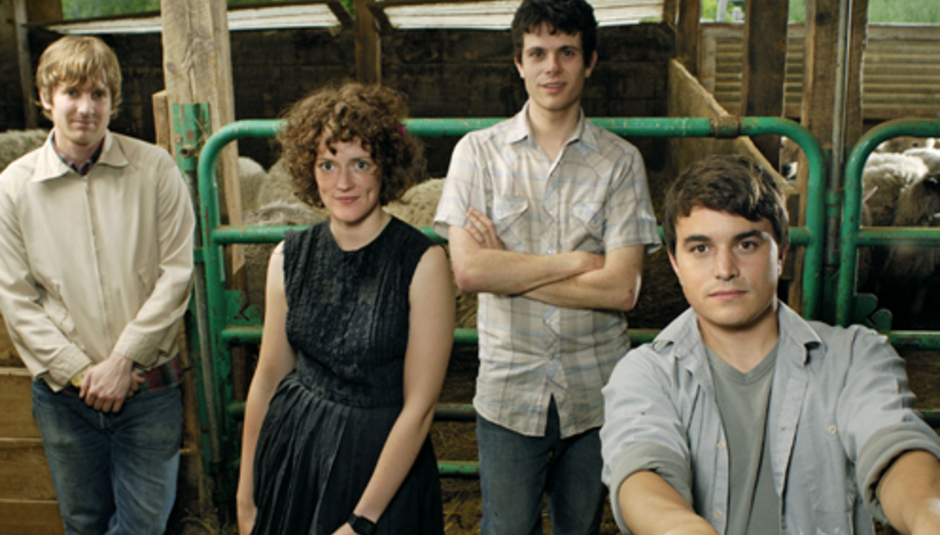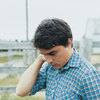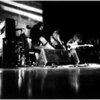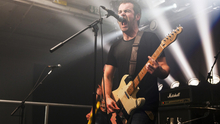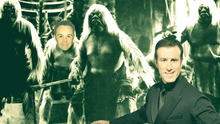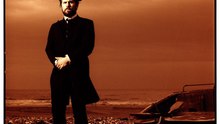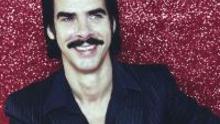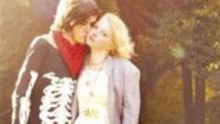With the UK leg of Sunset Rubdown’s tour beginning this week, DiS caught up with the band to talk about the new record, and how they formed… NB Some of Spencer's answers (on the phone from Sweden) have been run together with the band's, by e-mail.
Read Part I of our interview with Sunset Rubdown here.
DiS: Tell us about your previous bands, and how they started.
Camilla Wynne Ingr (keys, vox): I was in a band called Pony Up! for a few years. We put out one EP and toured a bit. They kicked me out a few months before I was asked to join Sunset Rubdown. I think I fit a lot better in this band. It makes more sense.
I'm not really very musical at all. Fortunately, Spencer is a very good teacher. For a long time I had a project called Secret Choir, an informal choral group. It was really good practice, though, and fun (whisky was often involved). We mainly did Sacred Harp music, but also songs in Persian, Japanese, old English... Because of all this, I think I find the recording process more musically rewarding that playing live — I’m not much of a 'jammer.'
Michael Doerksen (guitars): My first band was a four piece with Arlen Thompson [NB – now playing with some guys called Wolf Parade…] who were called Whether, formed in Victoria in 1998. We were inspired by a lot of post-rock at the time, God Speed, Tortoise, Trans-Am, but more importantly the Nihilist Spasm Band [who] played improvised noise for about a year and then members scattered. I came to Montreal and continued playing with Arlen in a few bands, one called The Ten Commandments, a folk based band that saw lots of members change over. Also in Montreal, the idea behind Whether mutated into a much larger ensemble called Trancelvania who still play occasionally. I also played briefly in a psych-rock band called ESP Snake. We only lasted about 9 months. Right now, I have a recording project called Deep Sleepover that involves me working with various people on my songs. I doubt it will ever become a real band. It feels much more like an art project or a performance piece.
Jordan Robson Cramer (drums, guitars): I took piano lessons from ages five to ten before making a fuss towards my parents in order to get an electric guitar at the age of ten so I could learn Smashing Pumpkins songs. My first band was embarrassingly called 'No Recess' and we made a CD that my parents somewhat foolishly printed 500 copies of – many of which were "sold" to friends and family. I got a drum set shortly after, and played in different bands in Victoria before I moved out to Montreal and met Spencer and the rest of the band.
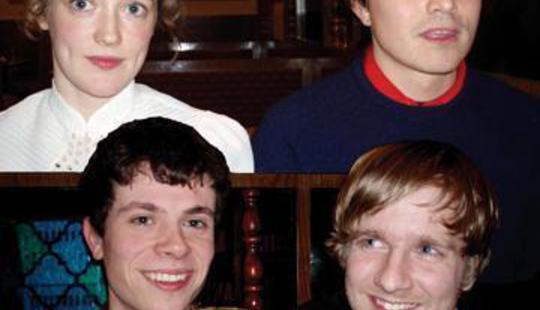
DiS: SunRub seems to be characterized by the juxtaposition of a naïve playing style with intricate arrangements overall… How conscious is that…? Does it follow naturally from songs with innocent-seeming characters… or do you want to counteract any feeling – that more conventional arrangements might convey – of the songs being po-faced, pristine artefacts…?
MD: Most of the time, when we're writing, I can't hear the lyrics, or they aren't finished. So I am mostly playing to the melody and emotion behind the singing before it becomes this conceptual whole that appears on the record. So if our playing sounds naive, then maybe the lyrics are having an effect on how you perceive our creative process. Making this music has been a creatively haphazard process, like a controlled explosion whose crater is always different than what you may expect. It involves a lot of jamming, listening to the character and arc of the song, getting it, and then nailing down what you want to do. We don't contrive some kind of perfect scheme as if it were a Disney movie, fit to the dialogue in every way. It’s more subliminal, or unconscious, or perhaps an unintentionally holophonic process, something going on in the pineal gland that we're not even aware of. the function creates the organ, sound created the ear, and so we follow each others sounds. As a band, we play what we can together, and in doing so, we occasionally discover that we can do a little more.
MD: I find this juxtaposition you suggest interesting, as if the intricate arrangements allow for layers of simple parts to come together, like five children jumping on a trampoline...room for chaos, and room for the perfect bounce. The songs have a lot of space but with a lot of detail. I like what Hitchcock said...you have a frame, fill it. Band's always have a tendency to define themselves against other bands, if not out loud, then in private, like a bad habit. And every member has some slightly different conception about the identity of the band and how it fits into their own personal understanding of music and pop culture. Sometimes the question "does that sound a little too much like this or that?" can arise. It’s the old anxiety of influence.
DiS: Who are SR’s unlikely influences… on the lyrical world, the whole sound, any of the specific styles or choice of effects? Where do you hear them?
JRC: I think there was a good year or so where I was really into Lightning Bolt and I think a lot of my drumming style was initially influenced by the amount of time I spent in awe listening to 'Wonderful Rainbow'. There's still a hefty amount of spazziness I still seem unable to restrain when I'm playing drums. The stuff that really got me into the guitar and the sounds you can make – specifically on the first two albums – were things I heard in bands like Television, The Birthday Party, My Bloody Valentine, Deerhoof: brittle and/or distant sounding guitars.
MD: I'm not sure we could all agree on who influences SR's sound. As a guitar player, the material for Dragonslayer gave me a chance to draw on the psychedelic and classic rock that I love, like Queen, Led Zeppelin, and the Rolling Stones.
DiS: Which artist’s lyrical and/or musical visions move you profoundly, and why? As musicians does the discovery of a new influence/style/technology have a comparable, or greater wow-factor (revitalizing your sense of possibilities)?
CWI: I've definitely been moved profoundly by music, probably more in an emotional way than in a cerebral way. And I find it all ties up a lot with things going on in my life at the time - there's a lot of nostalgia tied up in a lot of music for me, songs that bring back not particular events but just states of mind - though sometimes also I think these are completely created by the music itself, nothing to do with my outer world. They begin to blend seamlessly. As I write this I'm thinking mostly of Califone, Richard Buckner, and Xiu Xiu, but I'm not sure exactly why.
MD: For me it's people like Neil Young, Bob Dylan, Roy Harper, Townes Van Zandt, Leonard Cohen who have that kind of power that elevates music beyond entertainment. Van Zandt's record Our Mother the Mountain is a perfect example. Aside from songwriting, hearing a Steve Reich composition, or his tape phasing experiments for the first time certainly suggested a different way of thinking about music.
JRC: I remember being absolutely terrified by the world of Scott Walker while walking home one winter night while listening to 'The Drift' in its entirety. There was something very basic about how the music affected me yet it was one of those times where I really realized the amorphous nature of how sound and words can be used together. A lot of things I see make that 'wow-factor' inside of me but I think any translation that occurs is mostly unconscious and not specifically intentional.
DiS: A lot of the guitar and keyboard parts follow patterns that whirl or oscillate, rising and falling rapidly, making the listener think of Wurlitzers, concertinas, etc.; it’s pretty distinctive… what’s going on musically? What appeals to you about that sound?
CWI: Hypnosis... then we can surprise once the listener is relaxed.
MD: Yeah, like Camilla said. its all about magic and the devil's music.
SK: They’re called 'cyclical melodies' – I just like the way they sound. When you’re doing variations in composition, you take something, say a cyclical melody, that starts as a simple phrase, or gesture, and by the end you understand that it’s integral to some longer progression. The opening [keyboard] line of ‘Dragon’s Lair’ is a good example, because it’s there at the beginning, and then it’s something we belt out loud [singing]. So, when you hear a cyclical melody in a major key, and then in a minor key, with the same notes… it resonates in different ways. And you can change the modulation – that’s to say, using different key signatures. I guess it’s being a little bit clever, or cheeky… but it’s not trying to be clever. Cyclical melodies are the easiest thing to take that approach with [i.e. variations], because by their nature it’s something that wants to start over… and you can wander around.
DiS: With Dragonslayer, you seem to have arrived at something like Eno’s take on glam-rockm, in the mid-Seventies. Was Eno a conscious influence? (Thinking of Eno, what does the idea of the non-musician mean to you, and do you think you’ll ever feel the need to “unlearn” your instruments, or pick up ones you can’t play? Do the lyrics ever act as oblique strategies for the band’s parts?)
CWI: We rarely, if ever, have conscious influences. Everyone in the band has wildly different musical tastes. While I think most of us like Eno, no one is a fanatic. […] I'm not very familiar with Eno's idea of the non-musician, but sometimes I think that's practically what I am and that's why Spencer chose me. I know lately, too, he's been favouring the guitar because he's less good at it.
JRC: I know Spencer's into some Eno, I'm really into Eno, but we rarely talk about any influence before going to work on a song. Probably because we're all into different things at different times, it has an odd way of seeping into our songs. Often there will be certain words I will hear Spencer sing as we're initially working on a song that will serve as a kind of Oblique Strategy Card-type frame to how I'm going to approach what I add to it. Not having listened to the Swan Lake version of 'Paper Lace' really helped me approach the song in a different way by just having Spencer's guitar part and lyrics as a base. Spencer played us a Kinks song as a sort of ideal to live up to for the Sunset Rubdown version of that song. I think there was also some Kate Bush in mind as we were writing 'You Go On Ahead'.
MD: As I understand it, Eno's 'non-musician' is someone who can make music, but perhaps doesn't have the will or skill to fully embody or understand that role, like Eno getting bored with touring but still wanting to make music or calling playing something he doesn't know how to play a 'treatment'. It can be interesting to favour theory over practice in some cases, like how SR will record a song that may never get played live, but even in that case there is a form of sonic practice. I can relate to Eno's approach because I know some things about music, but not with the kind of grasp one learns in music school. Eno is someone I came across a lot in art school, so I always thought of him as a musician who became much more than that, more like an interdisciplinary artist, rather than a non-musician.
For a long time, I could only play the things that I learned in my guitar lessons, like blues riffs and funny chords. When I got bored with that stuff, I deliberately stopped playing in certain ways. I guess I have unlearned a lot of things, but it feels a lot more like not caring anymore and moving on. I'm really into circuit bending and DIY instruments. I built an analog synthesizer for SR that makes all kinds of sounds, but I am still getting to used to it. I'm not sure what it will do when I turn it on. The interface is all knobs and switches, built into an old arcade game control panel (Battlezone), so it is very intuitive and unpredictable. Its bright and looks like a toy, so I let my 4 year old niece play with it and she couldn't get enough.
DiS: The pacing of Random Spirit Lover allows plenty of space for the songs to work on the listeners mind, but there’s been a gradual condensation of lyrical and musical ideas over the four records. Is this a result of getting more confident about playing together on a purely practical level, or more confident about having a distinct musical identity while playing with the same old ingredients of gtr-bass-drums-keys?
MD: Perhaps the ways in which the records change reflects our confidence playing together, which has been entirely fortuitous. I would not describe the experience as 'taking our time to develop". Its more like waiting around for something to happen, and then working our asses off when we can.
JRC: I think over the years we've realized that a lot of what works for us as we're writing songs is when we sometimes stumble into these moments where we're like 'that sounds cool/weird' and all of us get psyched to get that feeling more concrete. I think the only thing that's been intentional insofar as the music's concerned was acknowledging that each of us inhabit a certain space musically and allowing that to evolve as we wrote the songs on Dragonslayer. I think we often come upon parts or certain sections of a song by chance but those things wind up being conceivably fused by the time we go to record the album.
DiS: How avant-garde would you say SunRub are/is, assuming the term has a meaning? Mogwai once said “next to U2, we’re Fugazi, but next to Fugazi we’re U2”. What names would SunRub pick?
CWI: Oh, I doubt we're very avant-garde at all. I think we just made a pop record, albeit a kind of weird one.
MD: Avant-garde carries as much meaning as you're willing to give it. It’s a term that is entirely relative to personal taste, where an avant-garde work of art represents some kind of aesthetic limit for you which is set against the many works of art you have experienced. so, if SR is avant-garde to someone, that is entirely relative to the other bands they listen to. Perhaps there is some undercurrent of political potency in the lyrics or the music, but there is nothing avant-garde about releasing records and then playing the same music in a club or a festival. In this regard, we are highly traditional... terribly entrenched in the limited machinations of indie rock whose bonds we are determined to destroy. But I'll play the Mogwai game. Next to Miley Cyrus, we're Aids Wolf, but next to Aids Wolf, we're Miley Cyrus.
DiS: One website called Dragonslayer a continuation of Spencer’s solipsism. It strikes me that any writing that’s strongly imagistic, rather than dealing in abstract emotions, can’t be solipsistic. Do you want to refute the charges… or defend the public exploration of your mind as a legitimate artistic activity? Who do you (each) rate as artists who do seem to just delve into their unconscious, with no preconceived message…?
CWI: I for one think that's total bullshit. I think it is possible to write songs that look inward without reducing the world to only one's self. Besides which, the lyrics for Dragonslayer are full of characters and metaphors, not ever clearly navel-gazing. And if they are centered on the self, they are centered on the self's interaction with the surrounding world, other kinds of people, etc.. But, then, I prefer songs that come from a place within the writer, rather than someone trying to create a picture of the world that has nothing to do with them... It's odd to me that people tend to think that dense lyrics are by necessity very introspective. I don't think that's always the case.
MD: I might look to Basquiat for that kind of expression of the unconscious, or at least an attempt at that, but even then, I always thought of the unconscious as something completely unaccessible...its just the invisible theorized gears under the surface of life that I am told is there, so its not something I intuitively know. Also, just because you have no preconceived message doesn't mean you are accessing the unconscious.
As a philosophical position, there is nothing terribly bad about solipsism, so I don't see it as an insult. Accusing spencer of solipsism may mean for the reviewer, that they just don't get the lyrics. Perhaps in wanting to understand an artist's worldview through their poetry, he gets tripped up on the heavy handed metaphors, thinks the singer is intentionally singing over the audience's head, and so solipsism is his conclusion. Maybe the reviewer feels he isn't being sung about or sung to, and therefore he confronts his own solipsistic question of "why can't I relate...am I alone?" so, it takes one to know one, but if you're solipsistic, the question becomes, can you ever really know someone? I don't believe you can't get to know someone through their art. its all mythology, and experiencing art is more about getting to know yourself.
DiS: What are your influences from the visual arts? What kind of training did you have?
CWI: Mike is the only one among us who's been to art school (and is going back this fall!). But most of us do some form of visual art... I make panorama eggs out of sugar.
MD: I have Bachelor of Fine Arts from Concordia University in Montreal and am returning to school this fall to start my Masters. I'm interested in the conceptual realism that sprung out of post-minimalism, and all the hybrid strategies that followed, artists like Charles Ray, Robert Gober, Paul McCarthy, Mike Kelley (Destroy All Monsters), Dennis Oppenheim, Tony Craig, Tom Friedman. The work I do is interdisciplinary, but my ideas come from the materials I work with, which can be just about anything. I tend to appropriate, combine, and manipulate things into critical versions or parodies of themselves. If you're interested, there's a lot of other stuff here
DiS: Who does what? Whose are the guitar heroics on ‘Black Swan’, ‘Dragonslayer’, etc.? How much direction is there, in terms of specific effects… or general emotional impact… or contribution to the narrative?
CWI: I play a keyboard, cymbals, a digital autoharp, a glockenspiel, and melodica, as well as singing. I'm sure the boys will tell you whose solos are whose... Everyone switches around a lot except for Spencer and I, though we switch between instruments at our own stations (for lack of a better word).
MD: I play guitar on every Dragonslayer song except ‘Paper Lace’ and ‘Apollo’, which I play bass. I can perhaps see what you mean about contributing to the narrative...some of the things I do in ‘Black Swan’ began to sound to me like swans squawking, going ape shit, and fighting other birds. But that was more of an after thought. At first, I was more interested in the dynamic shifts of the song, and wanted to play something that got progressively more abstract. Half of the freak outs on ‘Black Swan’ are this circuit bent instrument called the Cosmic Radio. I did not make this one. A stranger did. We also had a little bit of fun with that my parts during mixing by bringing in short bursts of parts from another take of the song. the tempos we're really really close. so what you are hearing is almost like two of me.
JRC: There's been a lot of moving about ever since the band has started. I use a Casio CTK-573 often as I'm playing drums - which has been part of the band since Shut Up... - but for Dragonslayer I am also using a Roland SP-404 sampler which can be heard at the very beginning of 'Silver Moons' among other places. I mostly stick to the drums these days but I play electric guitar on 'Paper Lace' and 'Apollo and the Buffalo'. I think I still have a very vested interest in trying to screw with sounds within the songs but in a way that will just be under the surface.
DiS: Which are the Spencer and the Camilla keyboard parts? Is there a typical division of rhythm parts and fills, and so on? Do you have typical choices of tone, or the 'voice' and mood of the instrument within the song?
CWI: Heh, it would be hard to explain which keyboard parts belong to whom. Jordan also plays keyboards (simultaneously with the drums), so sometimes we have three going at once. I hadn't thought about whether there's a typical division of what kind of thing we're all playing. I mean, generally Spencer's playing chords and bass, while I play melody, and Jordan does more atmospheric things. But that is a huge and not very helpful generalization.
I definitely have specific sounds that I favour on my electronic instruments... It's funny how things can sound really wrong, then sound great just by changing the sound or the instrument...
DiS: How much do you each contribute to arrangements? How often are the songs fully-formed before being presented to them?
CWI: Spencer will often show up with almost all the structure of a song, but things inevitably tend to change at least a little bit... It's a pretty organic process. Generally, though, I'd say the arrangements are mostly Spencer's.
DiS: Is there much pressure to be a different kind of band - as in, with an elaborate show? more banter? gimmicks, etc.? Do SunRub fans really care?
CWI: Definitely I feel that pressure a little bit, but I try not to worry about too much because I think we're sort of incapable of being a different kind of band. We are what we are--it would feel wrong and disingenuous to try to be gimmicky or more fun. I mean, we have some ideas for things we could do with the stage and with visuals, but I think they fit very well with what we are right now, and god knows when we'll get around to making them happen... I'm not sure whether our fans care. People still seem to come to shows...
JRC: Initially, when we started playing shows, there would be a lot of 'awkward' silences and I think it took us awhile to get to a point where the setlist became such a way that we could fill in the dead space somehow. The last tour we did was the first time we ever had a stage-prop every night and on the New York show of that tour my shirt got stuck to it as I was playing guitar. I was cracking up since I kept thinking of the scene in This is Spinal Tap where Derek Smalls is unable to leave the cocoon pods the band are supposed to emerge from as he's playing bass.
DiS: Is the live show going to change much, this autumn? Who are your best audiences?
CWI: We'll probably play a very similar set to what we did in the U.S. this summer. There's not a lot of time to change things up when you're touring so much...I'm not sure who our best audiences are. It's always great when people know the songs and get excited when we start playing them, so somewhere like NYC where we have a lot of fans is a lot of fun. On the other hand, sometimes you show up somewhere small where no one really knows you, but they have a really open, community-minded spirit and listen and have fun anyway, which is totally awesome. I think of Wetzlar, Germany, when I think of somewhere like that. We basically appreciate any audience that pays attention and doesn't talk through the set...
SK: Sometimes I actually like audiences that just stand there. You can freak out, and it’s like being an exhibitionist. With Wolf Parade, I’m used to dancing, and full moshpits starting, but with this band, when that happens, I’m a bit… seasoned to it, and that hardly ever happens. It’s a nice feeling if they move around.
[DiS reports having had the best time, like, EVER, at Sunset Rubdown and Wolf Parade shows at either end of 2008, which Spencer says is “nice”… and then asks how old the interviewer is.]
SK: But I haven’t been in a moshpit for 15 years, so I don’t mind if people stand at the back, because that’s what I do. But… one thing I do like is when, I look out and there are all kinds of people, not just 20 year olds. It’s fun if there are some 40 and 60 year olds, because then I think perhaps we’re more than just a current trend. That these may be people who have less interest in seeming cool… unless they’re a very shallow 50 year old. [DiS laughs]
DiS: What was the show, 15 years ago?
SK: Ah, I was a skateboarder kid, so that was like some punk show, and I had no idea about the politics or the history of it – like, why you mosh, or whatever. This was part of my childhood when I was 14 – 16. Bands like DOA, and NoMeansNo. Probably not Fugazi, because I thought Ian [McKaye] would be mad at us. But…I didn’t understand that this was the end of an era. I saw DOA and thought “Holy shit, these guys are old! Whatever…” You know what I mean? They were probably 40 or 50, and playing shows in community centres…
[DiS wishes the band luck with their European gigs, and frankly cannot wait for the London gig, tonight.]

